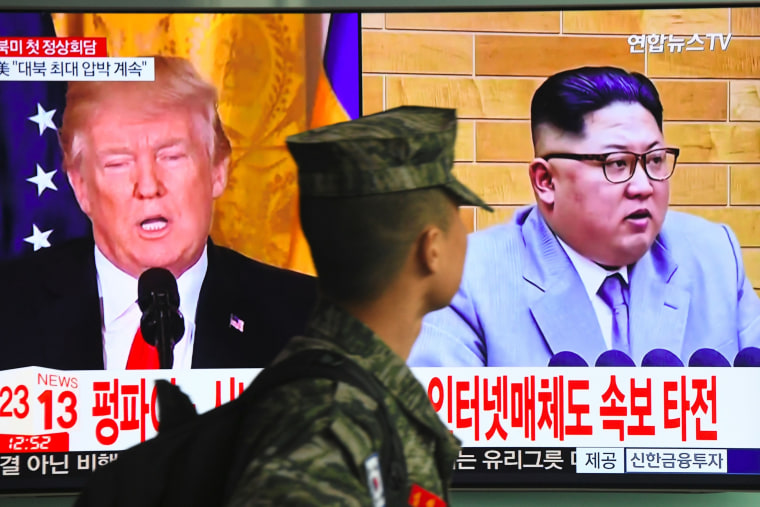On "Meet the Press" yesterday, NBC News' Chuck Todd raised a fair question while interviewing White House Legislative Affairs Director Marc Short. Ahead of Donald Trump's apparent talks with Kim Jong-un, the host asked, "What has the United States gotten from North Korea? ... We've given him the meeting. That in itself is a huge gift. What have we gotten in return?"
The president was apparently watching, and expressed his dissatisfaction via Twitter.
"Sleepy Eyes Chuck Todd of Fake News NBC just stated that we have given up so much in our negotiations with North Korea, and they have given up nothing. Wow, we haven't given up anything & they have agreed to denuclearization (so great for World), site closure, & no more testing!"
For now, let's put aside the president's unfortunate school-yard taunts and the fact that he seems to have the temperament of a spoiled child. Instead, let's consider this on the substance, which Trump may not understand as well as he should.
For example, he says the United States hasn't "given up anything." That's plainly false. For decades, North Korean dictators have sought meetings with American presidents in order to raise the legitimacy and stature of the rogue regime. Trump's predecessors -- in both parties -- easily could've agreed to a meeting like this, but they balked at giving the dictators what they wanted. Trump, meanwhile, agreed to such a meeting without any real forethought, deliberations, or strategy.
What's more, the Republican boasted yesterday that North Korean officials "have agreed to denuclearization." That's not even close to being true, and if Trump thinks he's correct, he's alarmingly ignorant about events he needs to understand. North Korea, in reality, has agreed to make this issue a part of the negotiations, but the gap between Kim Jong-un agreeing to give up his nuclear arsenal and Kim Jong-un agreeing to talk about giving up his nuclear arsenal is a chasm.
It's true that North Korea announced on Friday that it's pausing its nuclear and missile tests ahead of its talks with Trump, and that's certainly good news. It's also true, however, that there's no need for the United States to see this as a major concession: as far as Kim Jong-un is concerned, the pause is temporary; it can be renewed at any time; and North Korea's weapons program doesn't really need additional testing anyway. It's satisfied with the state of its nuclear capabilities.
All of which leads to an awkward question for the White House: why is the American president already helping the North Korean president ahead of their talks?
One need not be an expert in game theory to understand how the strategy should play out from the perspective of the United States: before we reach the table to engage in diplomacy, we should give the impression that we've already made important concessions and we expect North Korea to make comparable gestures.
Trump, whose understanding of negotiating and deal-making has been greatly exaggerated, is doing the opposite, telling the world before talks even begin that he believes North Korea has taken dramatic steps and the United States has done nothing.
This isn't smart. Trump was already a little too eager to give Kim Jong-un what he wanted, and now the American president is making things worse, weakening his negotiating posture -- for no apparent reason other than short-term domestic politics -- before the more difficult phase even gets underway.
It's a problem that Trump doesn't know what he's doing. It's a bigger problem that he believes the opposite.
